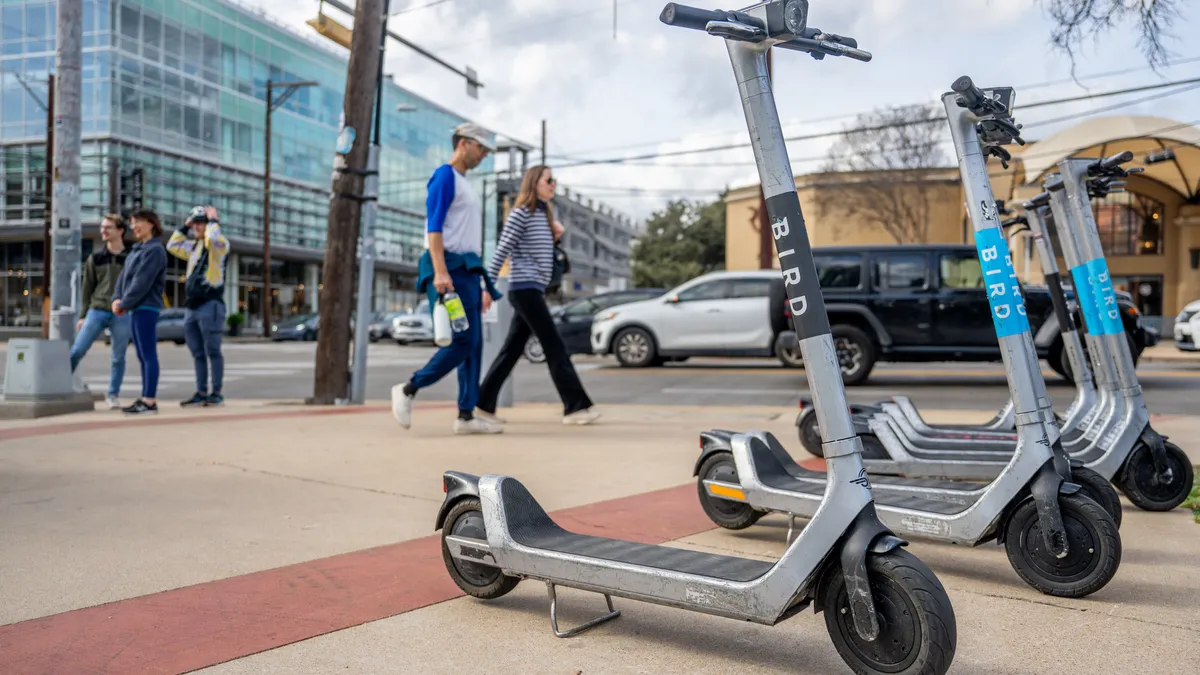2023 ended on a tumultuous note for the shared micromobility industry: Bird declared Chapter 11 bankruptcy, Micromobility.com delisted from the Nasdaq and Superpedestrian, which operated Link e-scooters, left the United States market in December due to financial difficulties.
Superpedestrian’s shutdown in particular caught many cities off guard and forced them to adapt their shared mobility offerings, officials in Seattle, Baltimore and Austin, Texas, said.
Seattle fills gaps with Bird and Lime
Despite industry tumult, Seattle’s shared scooter usage has kept humming. The Emerald City was an early adopter of shared micromobility and the first U.S. city to offer dockless shared bikes, which it did in 2017. Over the last few years, shared scooters have grown in popularity with residents. In May, it recorded 393,800 rides — a 15% increase from May 2023.
Although Seattle is a “bike type of city,” people who are not used to bicycling may find scooters more accessible, said Becky Edmonds, the Seattle Department of Transportation’s shared mobility program manager.
She added that scooters have Seattle-specific benefits. For example, the city’s rainy climate can leave a bike’s seat wet, which is not a problem on standing scooters. Also, navigating Seattle’s hilly roads by e-scooter can be less physically taxing than doing so by bike.
After Superpedestrian pulled out of the U.S., Seattle reassigned its roughly 2,000 Link permits to Bird and Lime, both of which already were operating in the city. Edmonds noted that Bird’s financial woes don’t seem to have impacted the company’s Seattle operations.
At the same time, “We're relying on private-sector partners to deliver this [service] that I think a lot of people find really, really valuable,” she said. “How do we make sure that it's steady? … I think it is something to consider when we're relying on companies that we can't control.”
Baltimore looks to Lime
With Link scooters no longer on its streets, Baltimore was down to one scooter operator, Spin (owned by Bird), at the beginning of the year, and 1,500 fewer scooters. On July 1, it brought those scooters back with a new vendor, Lime, and added 500 Lime e-bikes to its streets.
“I woke up this morning, looked outside and there were some Lime scooters, so I took one to work,” said Brett Thorne, chief of transportation services for the Baltimore City Department of Transportation.
Thorne said volatility in the scooter market was in the back of the city’s mind as it evaluated a second scooter operator in the city. Having two operators affords the city some protection should another company suddenly depart the market, he said.
Like officials in many cities, Thorne sees scooters as an important part of Baltimore’s transportation ecosystem and a way to connect people with other transportation services the city offers. Baltimore has a fare-free bus system that covers much of the city, but scooters offer a first- and last-mile transportation option for residents, Thorne said. “[It’s] just one more way for people to get out of a single-occupancy vehicle,” he added.
Austin scales back scooters
While Austin’s parking enterprise manager, Joseph Al-hajeri, wouldn’t call Superpedestrian’s departure a good thing, it coincided with discussions about reducing the number of scooters in Austin. Despite demand for the vehicles in the Texas capital, the clutter of scooters spread across streets and sidewalks had led Austin to reevaluate its scooter offerings, Al-hajeri said.
After Link removed its 2,000 e-scooters from the city, Austin chose not to replace them, instead reducing the number of permitted e-scooters to 6,700 to match the number of permits already held by Bird and Lime. The result is a 15% reduction in scooter ridership compared with the start of last year, Al-hajeri said.
However, Al-hajeri said Austin is in the process of establishing a new, simplified system that includes defining mandatory scooter parking areas, asking providers to rebalance device locations each morning in certain areas and improving the 311 complaint process regarding scooters. As the city makes these changes, it could eventually expand the number of licenses it offers, he said. Al-hajeri added that the city already temporarily allows more licenses during major events, like the multiweek South by Southwest conference and festival.
So far, the smaller number of scooter providers has made life a little easier for the city, which previously had to manage as many as nine shared scooter companies at once, Al-hajeri said. The city also plans pilot programs, such as reducing scooter speed limits downtown to 10 miles per hour, to address residents’ scooter-related concerns.
All of this is happening as CapMetro, the local public transit agency, rolls out an expanded bike-sharing program thanks to an $11.3 million federal grant. The funding will help CapMetro fully electrify the shared-bike fleet.



















